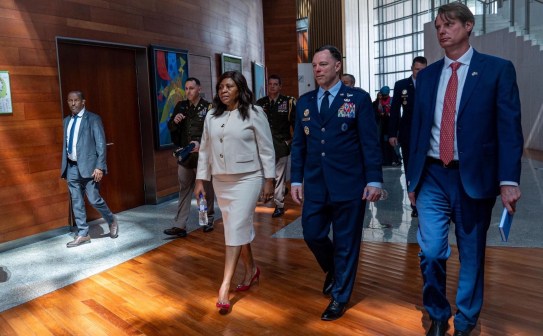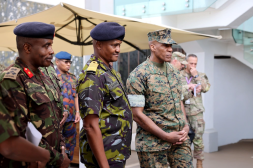
U.S. Africa Command is evaluating how to best apply technology with allies and partners to monitor rising adversarial influence, terrorism and other emerging threats as forces hustle to withdraw American military assets from Niger and Chad, and Western nations’ physical presence across the continent broadly shifts, Marine Corps Gen. Michael Langley told DefenseScoop.
In a telephonic briefing from Botswana on Monday, the Africom commander previewed his plans for the African Chiefs of Defense Conference that kicks off there Tuesday. Langley also shared new updates on the U.S.’s security posture and near-term operational plans in Africa.
“When I talk to all these countries, they’re not asking for U.S. troops on the ground, if you will, to any scope or magnitude. They say it’s their fight. They’re looking for capabilities — whether it be exquisite capabilities for intel-sharing, or being able to achieve the capability to identify indications and warnings for themselves — and that benefits both countries, because I’m charged to be able to identify indications and warnings of those that can hurt the homeland,” Langley said.
In May, the Defense Department announced that it had reached an agreement with the Nigerien military to remove all U.S. weapons and personnel from the West African nation — per the recent direction of the military junta that overthrew the elected government of Niger and installed the National Council for the Safeguard of the Homeland in July 2023.
Before then, American service members had been working directly with the Nigerien military for more than a decade. Inside the country, they’ve operated across two military bases known for their drone arsenal and associated missions, called Air Base 101 and Air Base 201.
“There’s a joint statement out between the U.S. government and Niger on us being able to complete the movement of equipment and personnel by 15 September. Right now, we’re on pace, on plan, moving heavy equipment out of Air Base 101, and it will conclude with Air Base 201,” Langley told reporters.
Following a similar demand from Chad’s leaders on the heels of Niger’s call, the U.S. military is now also removing forces from that nation as well.
In terms of his team’s overarching plan now, the general said Africom aims to work more closely with its partners in the region on tech-enabled activities to deter threats and respond to crises.
“I don’t measure that in the amount of equipment, or the relocation of equipment. I measure it by capabilities,” Langley explained. “So, with that … I went on a listening tour [across West Africa] to ensure that I understood and I learned what capabilities they need going forward.”
DefenseScoop asked the commander whether Africom will move to invest in more terrestrial, space-based, or other intelligence, surveillance, and reconnaissance (ISR) technologies to expand situational awareness and provide military leaders with a clear picture of the region — particularly once there are no longer U.S. boots on the ground.
“We’re assessing what we need to do to continue the counterterrorism fight. Our overall strategy, of course, to our ends are to deter threats and crisis response, but we’re also doubling down and bolstering partnership capacity and maintaining access and influence in a number of countries, and positive influence in a number of countries across the Sahel [region] and close to West Africa, because we see what direction the threat is going,” he responded.
In parallel with this “ongoing assessment,” Langley noted, the command also wants to help strengthen the capabilities of America’s African partners, who demonstrate “a shared interest and a shared threat that they’d like to counter themselves.”
“So building up their capability by, with, and through, is what is going to be our primary objective. It’s not measured in how much ISR that we have — but collectively how much capability and capacity our partners have to fight terrorism. And then we’ll determine what additive [types] of exquisite capabilities we do [need] to be able to give an overall advantage of being able to identify indications or warnings against the threat,” the commander told DefenseScoop.
Notably, against the backdrop of this transition, Langley also pointed to multiple ways Russia and China are each working fervently to outflank America and the West’s economic and military involvement and influence across Africa.
“The [People’s Republic of China] — they are very active on the African continent,” Langley told DefenseScoop.
Now that China has set up a naval base in Djibouti, the general said he knows they’re also “actively seeking and engaging with a number of other countries on the periphery of coastal West Africa, both in the East and in the West.”
“So, we’re actually watching it and trying to determine what their overall objectives are. Is it power projection? Is it air denial and anti-access? That is something to be considered, and we’re watching that all the time to determine what China’s overall intentions are engaging with these other countries,” Langley noted.
During the briefing, he also confirmed that the summit this week marks the first time the annual African Chiefs of Defense Conference is being held on the continent of Africa.
“It’s African-led and U.S.-enabled,” Langley added.
More than 30 nations will be involved in the event.
“Every country has their different types of challenges and drivers of instability. That’s what’s going to be [on the table] for discussion,” the Africom commander said.






